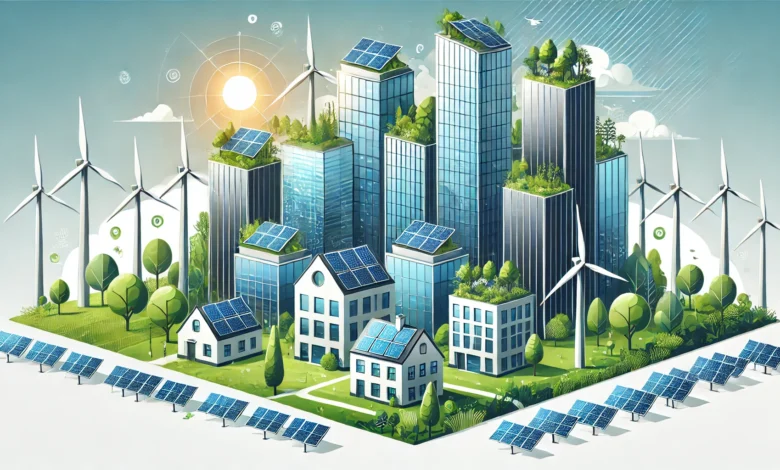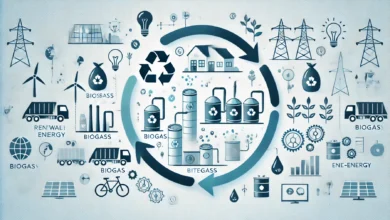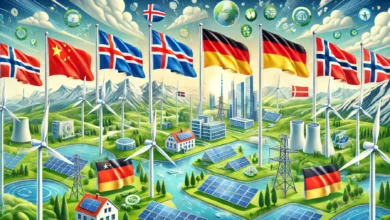Companies with Renewable Energy | Best Companies 2025

In 2025, corporate responsibility and renewable energy leadership are now dual values. Companies the world over are coming to the conclusion that sustainability is significantly more than a virtue signalling, it is a clear business tactic. By investing in solar energy, wind energy, and other renewable energy options, leading multinationals are in a better position for innovation, resilience and long-term profitability. Because of this, the adoption of renewable energy has moved from being a slightly awkward niche topic to a mainstream focus of business viability.
Contents
- 1 Why Are Companies Developing Renewable Energy Strategies?
- 2 Dimensions of Leading Renewable Companies
- 3 Leading Companies with Significant Renewable Energy Commitments 2025
- 4 Emerging Companies Making an Impact
- 5 The Business Case for Renewable Energy: Bottom Line Benefits
- 6 What Companies Face in Deploying Renewable Energy
- 7 The Future: Corporate Renewable Energy Adoption Trends
- 8 Frequently Asked Questions (FAQ)
- 8.1 Which company operates on 100% renewable energy?
- 8.2 Is a renewable energy company profitable?
- 8.3 What do you see as the fastest-growing sectors of the corporate renewable energy industry?
- 8.4 Why do corporations invest heavily in renewable energy?
- 8.5 What are some of the technologies that are positively disrupting the design, deployment and management of renewable energy?
Why Are Companies Developing Renewable Energy Strategies?
There are many strong forces contributing to the surge in corporate renewable investment. Companies are trying to reduce their carbon footprint and deal with the increasing pressure of regulation. Moreover, many companies see the inherent economic advantage of long-term pricing stability in their energy supply. Companies with sustainability plans can also benefit from a better brand reputation and greater stakeholder trust. From a competing perspective, not developing clean energy direction is no longer a burden but an economic necessity.
Dimensions of Leading Renewable Companies
- Goal Development: Leading companies are not shy about developing serious renewable energy goals, often 100% renewable energy.
- Innovative: They all invest in innovative technology improvements for efficiency and reliability.
- Transparent: Their progress efforts allow all parties to assess their performance through sustainability reporting.
- Collaborative: They partner with governments, NGOs, and energy companies to accelerate each of their renewables.
Leading Companies with Significant Renewable Energy Commitments 2025
Google (Alphabet)
Google has been at the forefront of corporate renewable energy commitments. In 2017, Google moved to 100% renewable energy usage. As it moves forward, Google plans to arrange for all of its sites to operate on 24/7 carbon-free energy by 2030. Google has been expanding its investment in many solar, wind and energy storage projects in markets throughout the world.
Amazon
Amazon is currently the world’s largest commercial buyer of renewable energy. It has committed to running all its operations on clean energy by 2025, five years ahead of its initial goal of 2030. This has driven investments into large solar farms, offshore wind projects, and battery storage.
Microsoft
Microsoft has committed to be carbon negative by 2030; in addition to scaling up investments in solar, wind and sustainable energy, which it is already doing, it is also financially supporting disruptive carbon capture technology. Microsoft has also committed to eliminating all historic carbon emissions by 2050.
Apple
Apple has powered its corporate operations using 100% renewable energy since 2018, but is going beyond that. Apple’s goal for 2025 is not just of powering its operations with clean energy, but also of its suppliers using clean energy as well as significant investments being made into solar and microgrid solutions across its global supply chain.
Tesla
Tesla has captured the renewable energy sector and wrapped it into its operations and products. With everything from solar roofs to massive battery systems to zero emission vehicles, Tesla continues to change how we think about clean energy and transportation. It continues to shift the sustainability movement forward and move sustainable energy technology into residential and commercial solutions as well.
Ørsted
Ørsted has undergone a dramatic transition from a diesel and fossil fuel company to a major offshore wind energy producer. Ørsted has publicly committed to moving to carbon neutrality by 2025, and is furthering its business plans by developing multiple offshore wind farms in Europe, Asia and North America.
Iberdrola
Iberdrola, based in Spain, is a global leader in wind energy production and continues to grow its offshore wind capabilities while investing heavily in smart grids and battery storage to solidify its position as a leader in clean energy solutions.
Emerging Companies Making an Impact
Innovative Startups Driving Change
Although major corporations garner much attention, emerging startups continue to advance renewable energy adoption. For example, companies such as Enphase Energy are changing residential solar technology, while Vestas leads global innovation in the wind turbine production realm. All combined, these companies make a significant contribution to the installation of clean energy capacity along with the advancement of renewable energy.
The Business Case for Renewable Energy: Bottom Line Benefits
The Bottom Line
- Cost Certainty: Long-term renewable contracts at a fixed rate allow businesses to hedge against volatility in fossil fuels cost.
- Reputation: Companies with sustainability or emissions reduction leadership foster brand loyalty, consumer trust and collective impact opportunities.
- Access to Capital: Investors are increasingly interested in companies with strong ESG profiles.
- Security and Risk: Examples of onsite generation and microgrids hedge against disruptions from power failures, natural disasters and deregulation.
What Companies Face in Deploying Renewable Energy
The Challenges
Numerous challenges exist to transition to renewable energy, despite significant advancements in technology and deployment. Companies face barriers such as limited grid infrastructure, expensive upfront investments, intermittency of renewable energy sources and shifting administrative regulations. Fortunately, with the assistance of technology like advanced battery storage and smart grids, the transition to renewable energy deployment is easier.
The Future: Corporate Renewable Energy Adoption Trends
Strategy Enablers
- Microgrids: Companies are investing more into self-sufficient onsite energy generation systems that can provide greater on-site resilience under their control.
- Blockchain: Blockchain will continue to facilitate energy security while providing opportunities for cleaner energy and greater transparency for customers.
- Scope 3 GHG Emission Reduction Initiatives: Organizations are beginning to look beyond their direct operations to include emission reduction plans related to their entire supply chain.
- Increase of Ambitious Net-Zero Commitments: Net-zero carbon goals will continue to gain more momentum and acceptance among companies to showcase their sustainable leadership.
Frequently Asked Questions (FAQ)
Which company operates on 100% renewable energy?
Companies, including Google, Apple, and Ørsted operate on 100% renewable energy for their global corporate operations.
Is a renewable energy company profitable?
Yes. The decline in technology costs, increasing applicants and supportive legislation have allowed renewable energy companies to provide increasing levels of profitability for their investors.
What do you see as the fastest-growing sectors of the corporate renewable energy industry?
Solar, wind and energy storage have been the leadership areas, while offshore wind and green hydrogen are emerging growth opportunities.
Why do corporations invest heavily in renewable energy?
Corporations have invested in renewable energy for cost savings, reduced risk, improved brand reputation, compliance and alignment with others in their value chain related to ESG.
What are some of the technologies that are positively disrupting the design, deployment and management of renewable energy?
Battery storage, microgrids, blockchain get a lot more efficient, so they allow for better management of clean energy in terms of on-site reliability and cleaner energy sources.
As we head into deeper parts of 2025, renewable energy leadership will be increasingly defining leadership in a competitive business world. Businesses that are pursuing sustainability and the transformation into a renewable energy systems will inherently lay the groundwork for a competitive, resilient and robust business enterprise.



